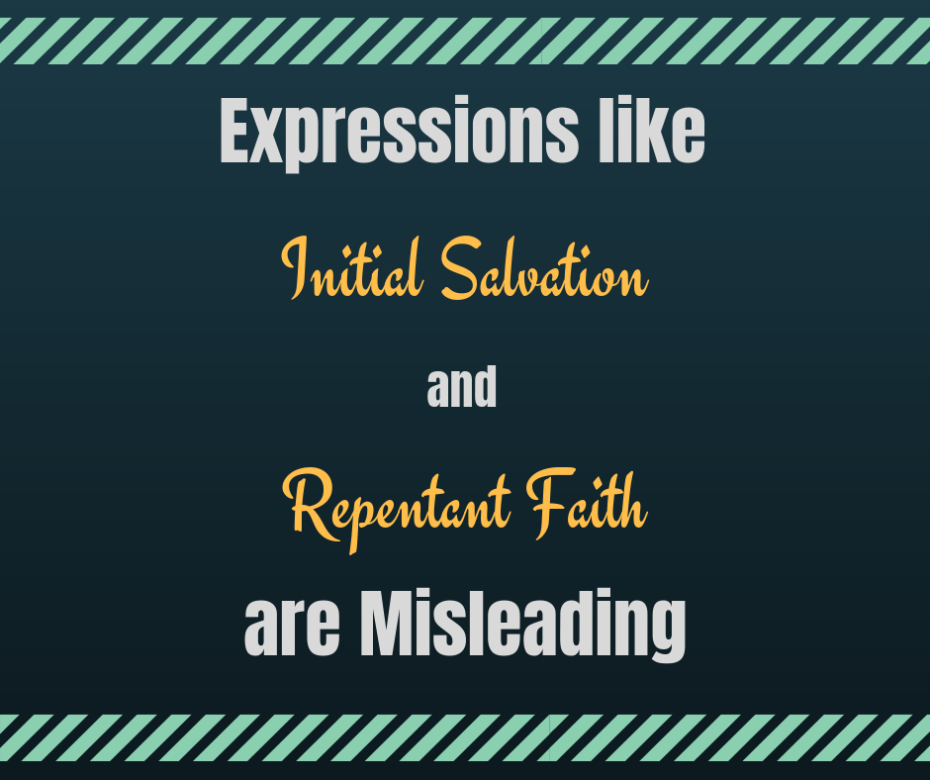Today I read a few articles in the July-September 2018 issue of Bibliotheca Sacra, the journal of Dallas Theological Seminary. It is celebrating its 175th anniversary (since DTS took over an already existing journal). Bibliotheca Sacra is one of the leading theological journals today. And it has been for a very long time.
In this issue, Bruce Compton provides Part 3 in a series of articles in which he defends the case for faith preceding regeneration. I agree with him. Faith does precede regeneration.
However, as I read, I found certain words and phrases used by him which for the last ten years I’ve been seeing a lot in Evangelical publications. These expressions have become common. Yet they are inaccurate and misleading.
Here are a few examples:
- Initial salvation. By my count, Compton uses this expression seven times (pp. 285, 287, 288, 291, 298, 301, 302). He never explains it.
- Repentant faith. Seven times he refers to “repentant faith” (pp. 292; 294; 295, twice; 297; 303, twice). The closest he comes to explaining this expression is when he writes, “illumination logically precedes repentant faith (repentance and faith) and…regeneration logically follows” (p. 292).
- Repentance and faith. In addition to the references to repentant faith, four times he speaks of repentance and faith as two separate things (pp. 292; 295; 301, twice).
I have difficulty with each of these expressions as they relate to soteriology, the doctrine of salvation (i.e., regeneration).
There is no such thing as initial salvation. The moment one believes in Christ, he is saved once and for all (John 11:26). Initial salvation is currently used to distinguish it from what is now called final salvation. Compton never uses the expression final salvation, and I’m glad. Possibly by initial salvation all he means is the point at which one’s everlasting life began. But in the climate of today, I find it misleading to speak of initial salvation.
Repentant faith is also something not found in the Bible. The Bible knows of repentance, and it knows of faith. But it never speaks of repentant faith. What is that?
I wonder what is next. Committed faith? Submissive faith? Persevering faith? Obedient faith? Confessing faith?
The exact expression repentance and faith is not found in the Bible. Yet there are two texts which are close—Acts 20:21 (“repentance toward God and faith toward our Lord Jesus Christ”) and Heb 6:1 (“the foundation of repentance from dead works and of faith toward God”). However, neither of those passages says that repentance and faith are two conditions of regeneration. Biblically the sole condition of everlasting life is faith in Christ. See this blog listing for over 100 such passages.
Interestingly, Compton most often merely speaks of faith as the sole condition of regeneration, which is great. I wonder why he occasionally instead spoke of repentant faith or repentance and faith as the condition(s) of everlasting life. None of the passages he cites support those expressions. I suspect he used those expressions because they are popular today.
Before I end this blog, I feel compelled to point out one other oddity, which I have seen occasionally elsewhere, in Compton’s article. In a section entitled “Two Provisions of Life,” he says, “two provisions of life are experienced in initial salvation. There is the initial temporary provision of life that logically precedes faith, and there is a subsequent permanent provision of life that logically follows faith. Again, it must be granted that this is a tension with placing faith prior to regeneration” (p. 301).
If I had not read the same sort of statement by other Calvinists, I would not know what he means. The way many Calvinists interpret the Parable of the Four Soils (Luke 8:5-15), for example, is that God gives some sort of temporary spiritual life to soils two and three, but since they don’t persevere (soil 2) or produce mature fruit (soil 3), they fail to receive the “permanent provision of life,” to use Compton’s expression.
I find it odd for Calvinists to speak of a “temporary provision of life.” Where in the Bible do we find two-part regeneration? What is this temporary spiritual life? It is not everlasting life. But it is spiritual life. It sounds like a way for Calvinists to adopt an essentially Arminian position, yet without going so far as to say that everlasting life can be lost. What can be lost is the “temporary provision of life.” But once one gets the “permanent provision of life,” then he is secure. But when does one get that? Compton says that permanent life is given when we believe in Christ. Other Calvinists say that we only get final salvation after we have persevered to the end of life in the race set before us. See this book review for more details.
I found it surprising to see Compton speak in this way since he earlier explains Acts 16:14—God opening Lydia’s heart that she might believe and be born again—as referring to illumination, not regeneration (pp. 292-94). However, when I re-read that section, I noticed that the final sentence does speak of some sort of spiritual life being given to Lydia when God opened her heart: “In short, illumination is that initial life-giving work of the Spirit that logically precedes and results in conversion” (p. 294).
Evangelicals need to be more careful in the words and phrases they use to discuss the saving message. Clarity is especially needed in soteriology.


